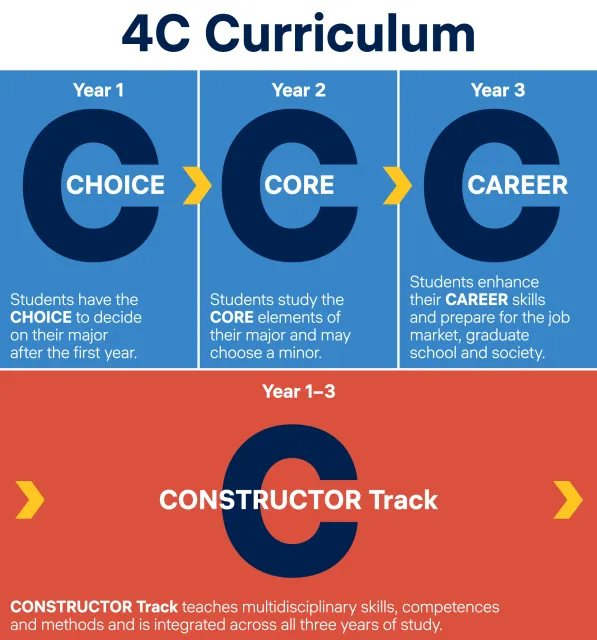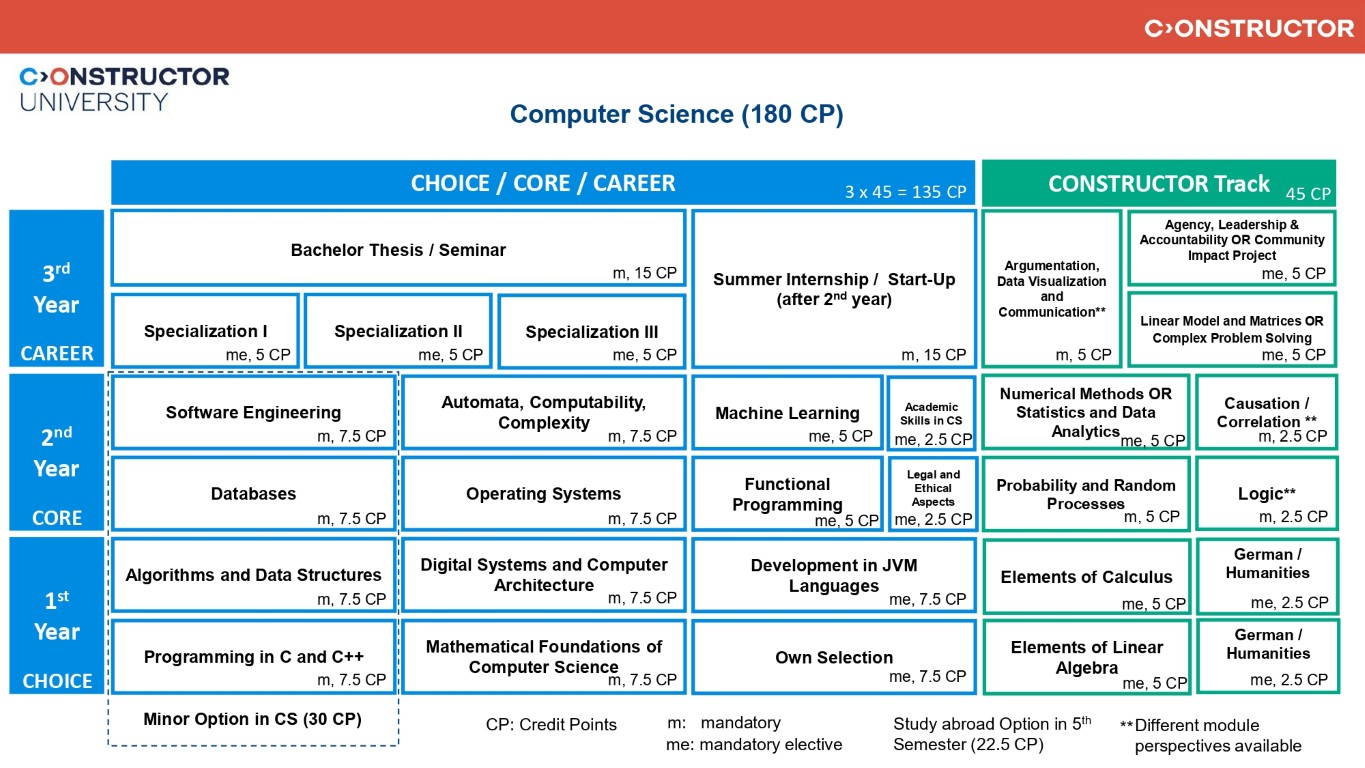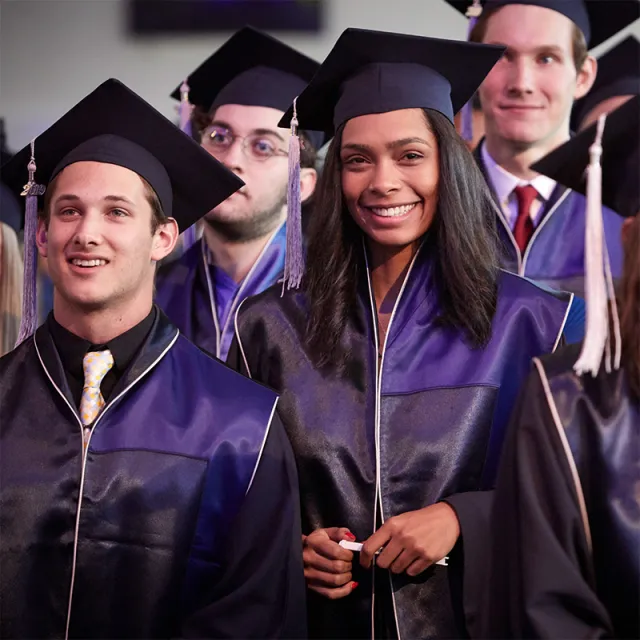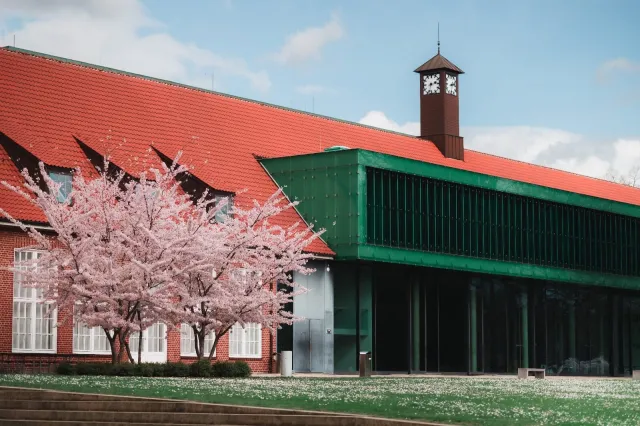

This study program belongs to the School of Computer Science & Engineering
Location: On Campus
Computer Science lies at the core of all modern industries, as computer systems and information technology are the basis for almost all of today’s production processes. Computer technology changes constantly, but some fundamental principles are underlying these technologies. The Computer Science program at Constructor University focuses on understanding these principles and their application in practice. In addition to courses dealing with core competencies (programming, software engineering, foundations of computer science), you will cover mathematics (calculus, linear algebra, and statistics) and take courses in engineering and sciences while conducting guided research.
For those interested in cybersecurity, our specialized track equips students with the necessary skills to tackle modern security challenges.
The undergraduate program at Constructor University is a three-year, 180-credit-point program designed to prepare students for a wide range of career paths.
The “4C Model” is the program's backbone, with disciplinary content grouped into three themes according to study years: CHOICE-CORE-CAREER. Additionally, the “CONSTRUCTOR Track”, an integral part of the program, runs parallel throughout the program. It provides students with multidisciplinary content and essential skills such as argumentation, data visualization, societal engagement, and communication.
The curriculum allows students to tailor their education to their goals and to explore different fields of study, with the flexibility to change their major within the first year. Moreover, the programs include a mandatory internship and a study-abroad opportunity in the fifth semester to provide students with hands-on experience and a global perspective.

The first study year is characterized by a broad offer in disciplinary education that builds on and extends the students’ entrance qualification. CS Students select introductory modules with a total of 45 CP from the CHOICE area of a variety of study programs, of which 15-45 CP will belong to their intended major.
To pursue Computer Science as a major, the following CHOICE modules (30 CP) need to be taken as mandatory (m) modules:
- CHOICE Module: Programming in C and C++ (m, 7.5 CP)
- CHOICE Module: Algorithms and Data Structures (m, 7.5 CP)
- CHOICE Module: Mathematical Foundations of Computer Science (m, 7.5 CP)
- CHOICE Module: Digital Systems and Computer Architecture (m, 7.5 CP)
The first two modules, Programming in C and C++ and Algorithms and Data Structures, introduce students to imperative and object-oriented programming and basic algorithms and data structures. The Mathematical Foundations of Computer Science module covers mathematical concepts like boolean algebra, propositional and predicate logic, abstract algebra, and graph theory. Students learn to work with formal notations and how to construct proofs. Starting with elementary digital gates, the Digital Systems and Computer Architecture module develops an understanding of how the hardware components of a computer system work. Students learn programming at the machine instruction level.
The remaining CHOICE module (7.5) in the first semester can be selected according to interest and/or with the aim to obtain a minor or to allow a change of major up until the beginning of the second year. In the second semester, students continue the choice they took in the first semester towards a possible minor or major change, or they take Development in JVM Languages, which introduces students to object-oriented programming in languages running on the Java virtual machine.
In their second year, students take a total of 45 CP from a selection of in-depth, discipline-specific CORE modules. Building on the introductory CHOICE modules and applying the methods and skills acquired so far, these modules aim to expand the students’ critical understanding of the key theories, principles, and methods in their major for the current state of knowledge and best practice.
CS students take 30 CP from the following CORE modules:
- CORE Module: Databases (m, 7.5 CP)
- CORE Module: Software Engineering (m, 7.5 CP)
- CORE Module: Operating Systems (m, 7.5 CP)
- CORE Module: Automata, Computability, and Complexity (m, 7.5 CP)
Students decide to complement their studies by taking the discipline-specific mandatory elective CORE modules (15 CP):
- CORE Module: Functional Programming (me, 5 CP)
- CORE Module: Legal and Ethical Aspects of Computer Science (me, 2.5 CP)
- CORE Module: Machine Learning (me, 5 CP)
- CORE Module: Academic Skills in Computer Science (me, 2.5 CP)
Or substitute these modules with CORE modules from a second field of studies with the aim to pursue a minor.
Students prepare and make decisions for their career after graduation during their third year. In addition, students take a mandatory summer internship to explore available choices fitting individual interests and gain professional experience.
The 5th semester also opens a mobility window for comprehensive study-abroad options. Finally, the 6th semester is dedicated to fostering students' research experience by involving them in an extended Bachelor thesis project.
To pursue CS as a major, 15 CP from the following mandatory elective Specialization Modules need to be taken:
- Computer Graphics (me, 5 CP)
- Image Processing (me, 5 CP)
- Distributed Algorithms (me, 5 CP)
- Web Application Development (me, 5 CP)
- Computer Networks (me, 5 CP)
- Secure and Dependable Systems (me, 5 CP)
- Computer Vision (me, 5 CP)
- Human Computer Interaction (me, 5 CP)
- Artificial Intelligence (me, 5 CP)
- Robotics (me, 5 CP)
- Machine Learning (me, 5 CP)
- Digital Design (me, 5 CP)
- Information Theory (me, 5 CP)
- Functional Programming (me, 5 CP)
- Parallel and Distributed Computing (me, 5 CP)
As part of Constructor University's commitment to student employability, all students are required to participate in a mandatory two-month internship of 15 CP that will usually be completed during the summer between the second and third year of study. It provides students with the opportunity to gain real-world experience in a professional setting, allowing them to apply their knowledge and understanding to a professional context, reflect on the relevance of their major to employment and society, and gain professional guidance. As an alternative to the full-time internship, students interested in setting up their own company can apply for a start-up option to focus on the development of their business plan.
The CONSTRUCTOR Track is another important feature of Constructor University’s educational model. The Constructor Track runs orthogonal to the disciplinary CHOICE, CORE, and CAREER modules across all study years and is an integral part of all undergraduate study programs. It provides an intellectual tool kit for lifelong learning and encourages the use of diverse methodologies to approach cross-disciplinary problems. The CONSTRUCTOR track contains Methods, New Skills and German Language and Humanities modules.
Methods
Methods and skills such as mathematics, statistics, programming, data handling, presentation skills, academic writing, and scientific and experimental skills are offered to all students as part of the Methods area in their curriculum. The modules that are specifically assigned to each study programs equip students with transferable academic skills. They convey and practice specific methods that are indispensable for each students’ chosen study program. Students are required to take 20 CP in the Methods area. The size of all Methods modules is 5 CP.
To pursue Computer Science as a major, the following Methods modules (20 CP) need to be taken as mandatory modules:
- Methods Module: Calculus and Elements of Linear Algebra I (m, 5 CP)
- Methods Module: Calculus and Elements of Linear Algebra II (m, 5 CP)
- Methods Module: Probability and Random Processes (m, 5 CP)
Students who have a strong mathematical background can also choose Matrix Algebra & Advanced Calculus I and II (me, 5 CP each) instead of Calculus and Elements of Linear Algebra I and II.
For the remaining 5 CP CS students can choose between the Methods modules
- Methods: Numerical Methods (me, 5 CP)
and the Mathematics, Modeling and Data Analytics CORE module:
- CORE Module: Discrete Mathematics (me, 5 CP)
New Skills Modules
This part of the curriculum constitutes an intellectual and conceptual tool kit that cultivates the capacity for a particular set of intellectual dispositions including curiosity, imagination, critical thought, and transferability. It nurtures a range of individual and societal capacities, such as self-reflection, argumentation and communication. Finally, it introduces students to the normative aspects of inquiry and research, including the norms governing sourcing, sharing, withholding materials and research results as well as others governing the responsibilities of expertise as well as the professional point of view. Students in this study program are required to take the following modules in their second and third year:
- New Skills Module: Logic (m, 2.5 CP)
- New Skills Module: Causation and Correlation (m, 2.5 CP)
- New Skills Module: Argumentation, Data Visualization and Communication (m, 5 CP)
Furthermore, they must choose either
- New Skills Module: Linear Model/Matrices (me, 5 CP) or
- New Skills Module: Complex Problem Solving (me, 5 CP)
as well one of the following modules:
- New Skills Module: Agency, Leadership and Accountability (me, 5 CP) or
- New Skills Module: Community Impact Project (me, 5 CP).
German Language and Humanities Modules
German language abilities foster students’ intercultural awareness and enhance their employability in their host country. They are also beneficial for securing mandatory internships (between the 2nd and 3rd year) in German companies and academic institutions. Constructor University supports its students in acquiring basic as well as advanced German skills in the first year of the Constructor Track. Non-native speakers of German are encouraged to take 2 German modules (2.5 CP each), but are not obliged to do so. Native speakers and other students not taking advantage of this offering take alternative modules in Humanities in each of the first two semesters.
The curriculum of the study program is outlined in the schematic study plan:

All study programs at Constructor University are accredited by the German Accreditation Council, guaranteeing adherence to high academic quality and international standards. This accreditation confirms that each program meets formal and subject-related criteria in terms of content, structure, and intended learning outcomes.
Join Constructor University in 5 easy steps:
- Complete your application
- Receive your decision after 3-4 weeks
- Learn about financing options
- Enroll and pay your deposit
- Settle in during O-Week and start your studies


Discover all the information you need about our fees and financing options for Constructor students. Our dedicated Student Financial Service Team will assist you in finding the best financial solution that will enable you to pursue your desired program and create a successful career path.
Cost of attendance 2025 / 2026
The direct costs of attendance include tuition, room and board, and fees, as outlined below.
Computer science is one of the key disciplines of the 21st century and affecting almost all modern industries. As a consequence, the possible career paths are very broad for graduates with a computer science degree and the job market is very favorable. The job market includes jobs such as software engineer, system integrator, information systems manager, data analyst, database administrator, application developer, cybersecurity analyst, IT consultant, or system analyst.
Start your career in one of the top tech industry-related companies
Graduates of the computer science program at our University have obtained positions in companies of the information technology sector such as Amazon, Cleversoft, Facebook, Google, Microsoft, SAP, Skype, 360 Treasury Systems, Twitter, Research Gate or VMware and within companies that are using information technology extensively such as the BMW Group, Deutsche Bank, KPMG, or Uber. Some graduates founded their own companies like Deep Web Solutions GmbH, Take Off Labs, or techOS GmbH.
Or continue your education at a leading university
Past graduates have also chosen to continue their education by enrolling in graduate programs at other German universities such as the RWTH Aachen, the Technical University Berlin, or the Technical University München; at other European universities such as the University of Amsterdam, the University of Cambridge, EPFL Lausanne, the University College London, the University of Oxford, or ETH Zürich; or at international universities such as the Carnegie Mellon University, Cornell University, or the University of Montreal.

This study program is part of the School of Computer Science & Engineering.
The School of Computer Science and Engineering focuses on research and development in information, communication, and production technologies, intelligent and autonomous systems, as well as the flow of goods.
Key disciplines in the school include Mathematics, Computer Science, Robotics, and Electrical Engineering.


Become part of a global community
Constructor University Students come from all over the world to live and learn at Constructor University. Our student body represents 120 nations. They form an ambitious campus community whose internationality is unprecedented in Europe. Constructor University’s green and tree-shaded 80-acre campus provides much more than buildings for teaching and research.

Call us or write us – we are happy to help you with your inquiry.
Phone: 0421 200 4200
Email: study@constructor.university





